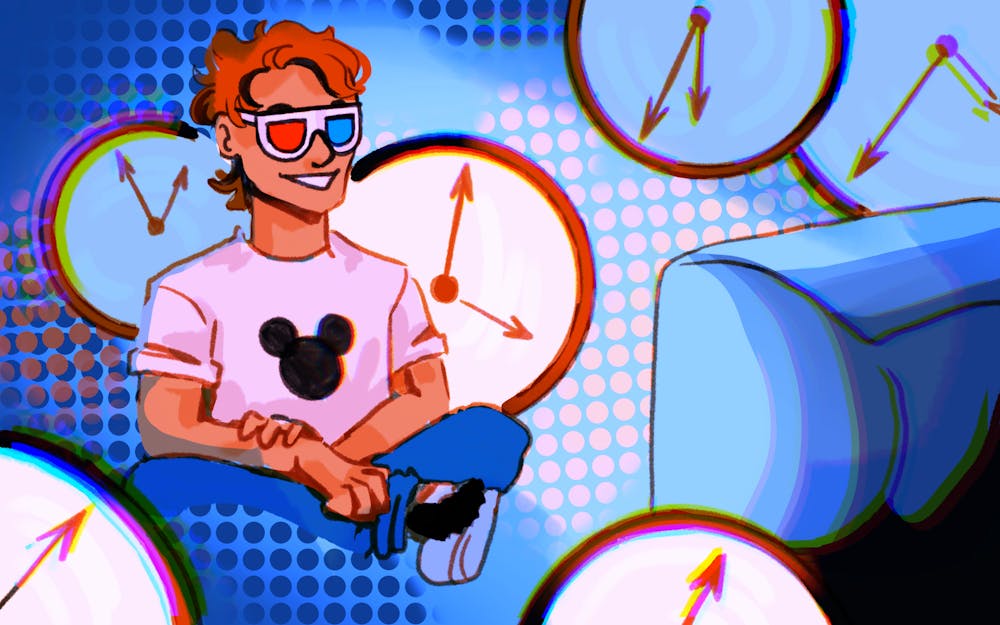The January weather brings dreary skies, naked trees and sullen raindrops into view. It’s a somber sight and keeps me hibernating indoors, waiting out the cold of winter. For some reason, this time inside spent drinking green tea and scrolling through social media under a mound of blankets pushes me to reflect on the past.
Perhaps that’s why I’ve been listening to MJ Lenderman on repeat. The alternative country singer’s music references old sports legends like Michael Jordan and Dan Marino, while also looking back on childhood memories of trips to Six Flags and wrestling with friends. His painfully wistful lyricism unearths a sense of nostalgia in the listener, even if you don’t share the same experiences.
Each song is drenched in a sentimental longing for the past, with an ache of despair for the hard truth that we can never really go back. The past is gone, but the feelings still remain. And that can be a beautiful thing, even when our nostalgia is targeted through social media and marketing.
Just the other day, I saw a TikTok slideshow about children’s picture books. Some of the photos included covers from books like “Harold and the Purple Crayon” and “The Teacher from the Black Lagoon.” I can’t remember a single detail about what happened in either of these books, but I do remember the feelings I got while reading them as a little girl. And the strength of those feelings floods my whole body. The way I’m thrust back into my childhood self just from the imagery of what I used to read is an intense feeling.
In reflecting on my childhood, I also thought about what it was like to grow up with siblings. There was a time when I saw my brother and sister every day because we all lived under the same roof. I can remember running errands with my sister, on which we’d usually strain our voices singing Kings of Leon in the car and then end the day at Sonic for an impromptu ice cream treat. Now, all my siblings are married, living out of the house and building lives of their own. I’ll probably never be able to see my siblings on an everyday basis again, and the realization of this pains me because I didn’t appreciate the memories until the moments had passed.
Here’s where nostalgia works in my favor, though. While I can never recreate these memories, I can reflect on them with a fondness for what once was. Thinking about the past encourages me to live every day with a greater sense of appreciation for my experiences before they are gone. While nostalgia is oftentimes a warm feeling, it can also be painful. This constant yearning for memories long gone can keep me awake at night. Nostalgia wraps its arms around me and it feels like a hug from an old friend. But if I’m not careful, I think it will swallow me whole. And brands are quick to take advantage of this power.
Oftentimes, companies use what’s called the nostalgia effect to coerce consumers into spending money so one can feel like they did as a kid. When a brand preys upon our sentimentality, it evokes a sense of longing in us. Take McDonald’s, for example. In the past few years, we’ve seen a rise in the offering of the adult Happy Meal. There’s no food in an adult happy meal that isn’t already on the McDonald’s menu, but the packaging and inclusion of a toy makes me think back to when I was a kid and my mom would get me a Happy Meal after a day at the public pool. I don’t want to spend money, and I’m trying to avoid eating fast food, yet I can’t stop myself from purchasing an adult Happy Meal each time McDonald’s has one available. Even so, eating a Happy Meal as an adult doesn’t elicit the same childlike wonder it did when I was a kid. While the evocation of nostalgia can influence consumers to spend money, our memories cannot be replicated to the same effect.
Just look at the relatively recent phenomenon of the Hollywood remake film. In the last 10 years, popular films from the 1970s and 1980s have seen remake after remake. While some of these rebooted films are entertaining, they always fall flat in comparison to the original. The 2016 “Ghostbusters” film was funny, but lacked the ironic humor and eccentric lunacy of Bill Murray that made the original “Ghostbusters” from 1984 truly iconic. More often than not when I see these reboots, I leave the theater feeling disappointed. Sadly, I just don’t think it’s possible to recreate the past no matter how tempting it is.
Given its power over our emotions, it’s important to treat nostalgia as a cautionary tale. We may find comfort in the refuge of the past, but the good old days are long gone. It can be cathartic to reflect on our experiences, but it’s also important to look toward the future and make new memories. Nostalgia can help us do both as long as we don’t let the past dictate our lives.
Erin Stafford (she/her) is a senior studying journalism with a minor in English.






